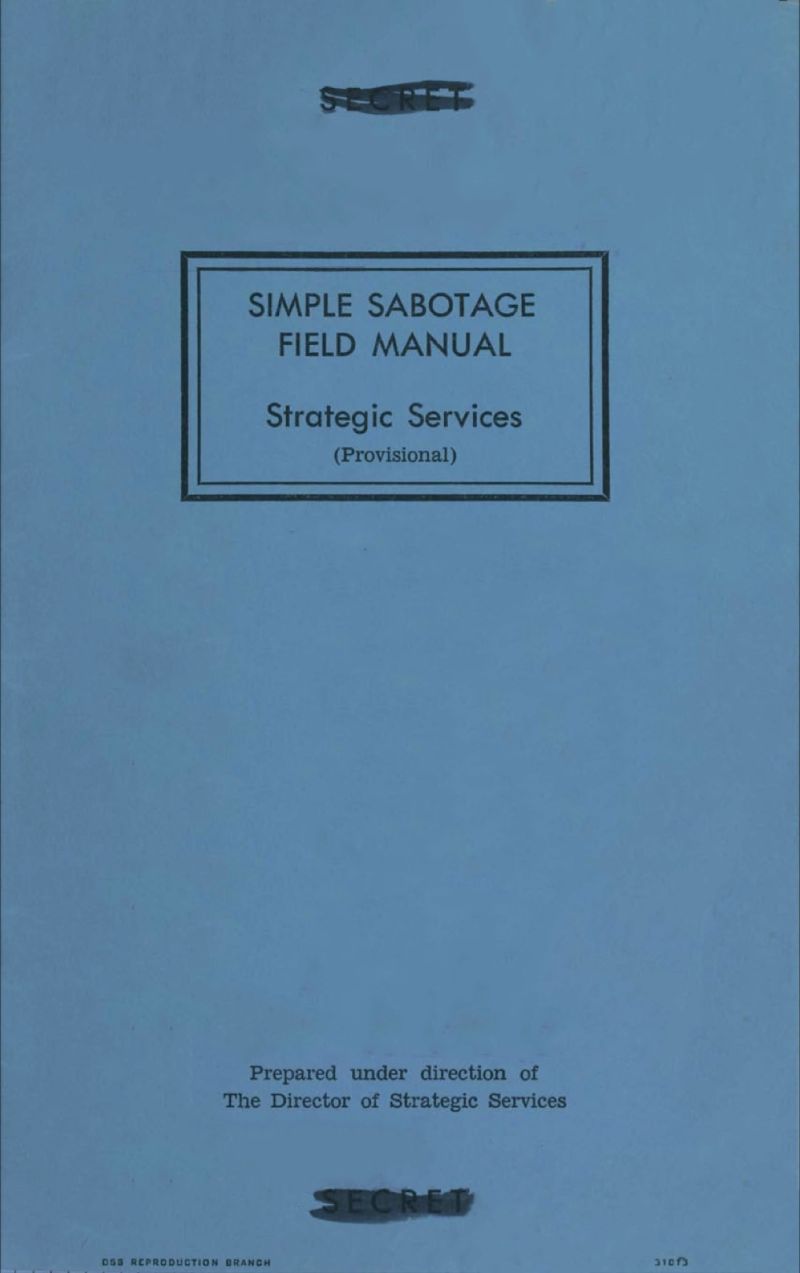“Hogyan gyártsunk Alzheimer-kórt magunknak?” Hogy pont az ellenkezőjét csináljuk, mint amit a jobb összefoglalások javasolnak pontosan az elkerülésére (ne együnk egészségesen, viszont sokat, ne mozogjunk eleget, rendszertelenül és főleg keveset aludjunk, bámuljuk a tv-t napestig, nehogy az agyunk túl legyen terhelve, ilyenek…).
Nos, erre rímelhet a sharelt post.. állítólag 1944-ből való, és állítólag a CIA elődje, az OSS adta ki az ügynökeinek, hogy beférkőzve az ellenség hátországában működô, a háború kimenetele szempontjából döntő jelentőségű hadiüzemekbe pontosan milyen módszerekkel is lazítsák fel azokat, remélhetően jelentősen rontva a működésük hatékonyságát.
Mondható, hogy remek ez a 25 pontban összefoglalt javaslat csokor, érdemes tanulmányozni. Amennyiben cégednél bármelyiket felfedeznéd, az nyilván csak egy késői főhajtás az amerikai titkos-szolgálat géniusza előtt…
Ez az anyag itt-ott felbukkant már a social media-ban, de mindig egy valódi treat szemezgetni benne…:-)))

Az angol szöveg:
„n 1944, the CIA wrote a handbook on how to sabotage (enemy) organizations from the inside. A few interesting tips:
(1) Insist on doing everything through “channels.” Never permit short-cuts to be taken in order to expedite decisions.
(2) Make “speeches.” Talk as frequently as possible and at great length.
(3) When possible, refer all matters to committees, for “further study and consideration.” Attempt to make the committees as large as possible—never less than five.
(4) Bring up irrelevant issues as frequently as possible.
(5) Haggle over precise wordings of communications, minutes, resolutions.
(6) Refer back to matters decided upon at the last meeting and attempt to re-open the question of the advisability of that decision.
(7) Demand written orders.
(8) “Misunderstand” orders. Ask endless questions or engage in long correspondence about such orders. Quibble over them when you can.
(9) Do everything possible to delay the delivery of orders. Even though parts of an order may be ready beforehand, don’t deliver it until it is completely ready.
(10) In making work assignments, always sign out the unimportant jobs first.
(11) Insist on perfect work in relatively unimportant products; send back for refinishing those which have the least flaw. Approve other defective parts whose flaws are not visible to the naked eye.
(12) When training new workers, give incomplete or misleading instructions.
(13) To lower morale and with it, production, be pleasant to inefficient workers; give them undeserved promotions. Discriminate against efficient workers; complain unjustly about their work.
(14) Hold conferences when there is more critical work to be done.
(15) Multiply paper work in plausible ways.
(16) Start duplicate files.
(17) Multiply the procedures and clearances involved in issuing instructions, pay checks, and so on. See that three people have to approve everything where one would do.
(18) Apply all regulations to the last letter.
(19) Do your work poorly and blame it on bad tools, machinery, or equipment. Complain that these things are preventing you from doing your job right.
(20) Never pass on your skill and experience to a new or less skillful worker.
(21) Snarl up administration in every possible way. Fill out forms illegibly so that they will have to be done over; make mistakes or omit requested information in forms.
(22) Give lengthy and incomprehensible explanations when questioned.
(23) Act stupid.
(24) Be as irritable and quarrelsome as possible without getting
yourself into trouble.
(25) Misunderstand all sorts of regulations concerning such matters as rationing, transportation, traffic regulations.
New Year’s resolution: Do the exact opposite.”






